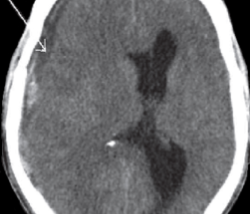
Can the drug Keppra cause extreme weakness and sleepiness?
Keppra is an anti-seizure medication. It’s not just given to those with a chronic seizure disorder.
It’s also prescribed for people who are at risk for having a seizure due to head trauma, such as after hitting their head from a fall.
My mother was given Keppra while recuperating in the hospital after undergoing a burr hole procedure for a chronic subdural hematoma (cSDH) which had been caused by hitting her head in a fall.
She was admitted on a Sunday and released the following Thursday, quite feisty, alert and having no problems with her walking.
It’s common protocol to put a patient, having just undergone the burr hole procedure for cSDH, on some kind of anti-seizure drug, such as Keppra.
This is a precaution, since risk of seizures is elevated for about a month after such a procedure.
My mother was initially put on the anticonvulsant Dilantin, but at some point near the end of her stay was switched to Keppra.
The evening of her discharge she seemed well on her way to recovery and was walking about the house without a hitch, was alert and interactive.
The Keppra prescription was for 500 mg morning and evening.
She took the drug that evening — and next morning awakened complaining of dizziness and weakness: unsteady, lethargic, weak-looking gait.
Her presentation definitely looked medication-induced.
She was dizzy and unsteady all day, and this caused her to fall outside.
As the day progressed the symptoms worsened to the point where I began suspecting that the fall shook up the 4 mm cSDH that the neurosurgeon hadn’t drained because of its small size.
The burr hole procedure had been done only on a larger cSDH; he had left the 4 mm alone, believing it would resolve on its own.
But with my mother’s weakness and lethargy worsening, I thought that the fall might have aggravated the 4 mm leak.
I then gave her the night dose of Keppra. The weakness progressed.
I got ahold of the neurosurgeon and asked if this mysterious weakness could be from the Keppra. He doubted it but authorized me to stop giving it to her.
So here I’m thinking it’s the brain bleed aggravated by the fall.
But if the weakness is from the Keppra, my mother should be better next morning.
Next morning she was worse. She couldn’t walk and had to be pushed in a wheelchair.
She wasn’t all there mentally; was not able to address simple questions, and gave conflicting answers to questions about whether or not she had pain. Appetite was nonexistent.
She remained in her robe all day long, and for most of the day, slept, save for about one hour where she was watching TV and eating a little. But then right after, she went back to sleep in a chair.
Her voice was very feeble, requiring effort to speak. She was not conversational and had little interest in speaking to one of her out-of-state kids who called.
She couldn’t even interact with her husband, was very apathetic and seemed to be heading towards a stuporous state.
Could this extreme sleepiness, weakness and brain fog really be side effects of Keppra?
Or was that 4 mm brain bleed now triple in size?
“It’s well-recognized that Keppra can cause drowsiness or weakness,” says Dr. David Beatty, MD, a retired general practitioner with 30+ years of experience and an instructor of general medicine for 20+ years.
“Some people find that their body gets used to Keppra after a week or two, and the side effects become less.
“If not, they should discuss the problem with their doctor.
“They shouldn’t drive or operate machinery if they don’t feel alert.”
Of course, there’s a huge difference between the typical drowsiness and weakness from a drug, and the more severe symptoms that my mother had been experiencing.
A cSDH can cause relatively sudden global body weakness, which was what my mother’s larger cSDH had caused.
I was witnessing a very similar symptom. A head injury can also cause sleepiness — but the tipoff that it’s more likely from an injury rather than a drug is that the symptom is progressive.
Another Head CAT Scan
I took my mother to the ER for another CAT scan, which turned out to show “improvement” over the one she had had at the hospital following the burr hole procedure, and the 4 mm bleed was gone!
The CAT scan showed no explanation for her severe weakness, lethargy, apathy, sleepiness and earlier-in-the day mental status change.
The ER doctor determined that my mother had sustained an adverse reaction to Keppra, and that it should wear off.
Though drowsiness and a fatigued feeling may be more common side effects, this drug — like so many pharmaceuticals — can uncommonly cause confusion or more severe symptoms in some individuals.
In fact, that evening in the ER, my mother began showing some improvement: better-sounding speech and was conversational. She was kept overnight for observation.
The day after she was much better, and the physical therapist didn’t detect any neurological deficits.
The ER doctor consulted with the neurosurgeon, analyzed the CAT scans and discharged my mother with a diagnosis of weakness caused by Keppra. She had been a complete zombie the day before.
Though some people tolerate Keppra quite well, my mother didn’t.
This doesn’t mean that Keppra can’t work wonders for other people.
But it does indeed mean that if you or someone you know experiences sudden deterioration in mobility, strength, mood, alertness, conversational skills and wakefulness, and that person was recently put on Keppra (or another drug), you should consider that it might be the medication and express this concern to the prescribing doctor.

 Dr. Beatty has worked in primary medicine, surgery, accident and emergency, OBGYN, pediatrics and chronic disease management. He is the Doctor of Medicine for
Dr. Beatty has worked in primary medicine, surgery, accident and emergency, OBGYN, pediatrics and chronic disease management. He is the Doctor of Medicine for 







































